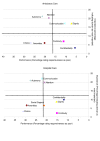How does mental health care perform in respect to service users' expectations? Evaluating inpatient and outpatient care in Germany with the WHO responsiveness concept
- PMID: 17605786
- PMCID: PMC1931438
- DOI: 10.1186/1472-6963-7-99
How does mental health care perform in respect to service users' expectations? Evaluating inpatient and outpatient care in Germany with the WHO responsiveness concept
Abstract
Background: Health systems increasingly try to make their services more responsive to users' expectations. In the context of the World Health Report 2000, WHO developed the concept of health system responsiveness as a performance parameter. Responsiveness relates to the system's ability to respond to service users' legitimate expectations of non-medical aspects. We used this concept in an effort to evaluate the performance of mental health care in a catchment area in Germany.
Methods: In accordance with the method WHO used for its responsiveness survey, responsiveness for inpatient and outpatient mental health care was evaluated by a standardised questionnaire. Responsiveness was assessed in the following domains: attention, dignity, clear communication, autonomy, confidentiality, basic amenities, choice of health care provider, continuity, and access to social support. Users with complex mental health care needs (i.e., requiring social and medical services or inpatient care) were recruited consecutively within the mental health services provided in the catchment area of the Hanover Medical School.
Results: 221 persons were recruited in outpatient care and 91 in inpatient care. Inpatient service users reported poor responsiveness (22%) more often than outpatients did (15%); however this was significant only for the domains dignity and communication. The best performing domains were confidentiality and dignity; the worst performing were choice, autonomy and basic amenities (only inpatient care). Autonomy was rated as the most important domain, followed by attention and communication. Responsiveness within outpatient care was rated worse by people who had less money and were less well educated. Inpatient responsiveness was rated better by those with a higher level of education and also by those who were not so well educated. 23% of participants reported having been discriminated against in mental health care during the past 6 months. The results are similar to prior responsiveness surveys with regard to the overall better performance of outpatient care. Where results differ, this can best be explained by certain characteristics that are applicable to mental health care and also by the users with complex needs. The expectations of attention and autonomy, including participation in the treatment process, are not met satisfactorily in inpatient and outpatient care.
Conclusion: Responsiveness as a health system performance parameter provides a refined picture of inpatient and outpatient mental health care. Reforms to the services provided should be orientated around domains that are high in importance, but low in performance. Measuring responsiveness could provide well-grounded guidance for further development of mental health care systems towards becoming better patient-orientated and providing patients with more respect.
Figures
References
-
- WHO . World Health Report 2000: Health Systems: Improving Performance. Geneva, World Health Organisation; 2000.
-
- Valentine N, de Silva A, Kawabata K, Darby C, Murray CJL, Evans DB. Health system responsiveness: Concepts, domains and operationalization. In: CJL M and DB E, editor. Health System Performance, Debates, Methods and Empiricism. Geneva, World Health Organization; 2003. pp. 574–596.
-
- Gostin L, Hodge JG, Valentine N, Nygren-Krug H. The Domains of Health Responsiveness A Human Rights Analysis. World Health Organisation; 2003.
-
- WHO . Background paper for the technical consultation on responsiveness concepts and measurement. Geneva, World Health Organization; 2001.
Publication types
MeSH terms
LinkOut - more resources
Full Text Sources
Medical
Miscellaneous



